How to clean a washing machine from smells with vinegar?
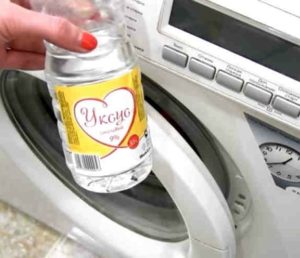 The housewife will not put up with a foul-smelling washing machine. Moreover, it is not difficult to restore freshness to the machine: just purchase a special product. If professional compounds are too expensive, then you can clean the washing machine with vinegar to remove the smell. Despite its own pungent odor, acetic acid can effectively fight dirt and mold, eliminating extraneous odors. All that remains is to figure out how the product works and where to start.
The housewife will not put up with a foul-smelling washing machine. Moreover, it is not difficult to restore freshness to the machine: just purchase a special product. If professional compounds are too expensive, then you can clean the washing machine with vinegar to remove the smell. Despite its own pungent odor, acetic acid can effectively fight dirt and mold, eliminating extraneous odors. All that remains is to figure out how the product works and where to start.
Instructions for cleaning the machine with vinegar
To clean a washing machine with vinegar at home, you will need time, desire, and the liquid itself. It is necessary to purchase ready-made acetic acid in a 10% concentration or dilute the existing 70%: dilute with water in a ratio of 1 to 10. Next, put on rubber gloves and start cleaning.
To clean the washing machine, use 10% vinegar.
It is recommended to adhere to the following sequence:
- check that there are no forgotten items in the drum;
- pour 250 ml of vinegar diluted to 10% into the powder receptacle (select the compartment for the conditioner);
- turn on the program with the longest duration (usually “Cotton”, “Intensive”, “Children’s”);
- set the maximum possible temperature (from 60 to 95 degrees depending on the machine);
- turn off rinsing to prevent cold water intake;
- cancel spin;
- start the cycle, and after ten minutes pause the washing (if there is no such option, then you need to disconnect the washing machine from the power supply);
- leave the machine with a full tank for at least 1.5 hours, giving the vinegar a chance to eat away the layer of scale and dirt;
- after 1.5 hours, continue high-temperature washing for another 1.5-2 hours.
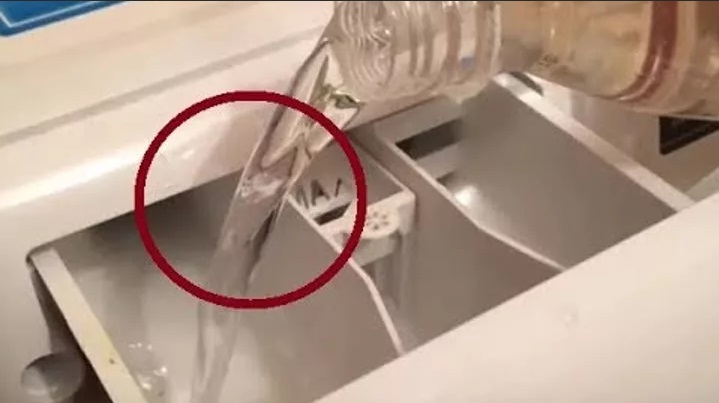
If the washing machine is being cleaned for the first time in a long time, then it is better to repeat the procedure at least 3 times in a row. It is advisable to wipe the hatch cuff with the remaining vinegar solution to remove dirt, plaque and mold that accumulate there. It is enough to moisten a sponge in vinegar and carefully treat the gum.
After this procedure, the machine will be cleared of scale and will stop emitting unpleasant odors. All that remains is to rinse the machine several times and dry it to remove vinegar fumes.
Pros and cons of cleaning with vinegar
Before you pour vinegar into the machine, you should get acquainted with its advantages and disadvantages. Like any other cleaner, acetic acid has its strengths and weaknesses. The first include high efficiency, availability and safety.
Thus, the composition of acetic acid is characterized by high chemical activity and disinfectant properties. Vinegar easily and quickly corrodes lime deposits to the smallest particles, washes away soap scum without leaving a residue, kills mold, fungal bacteria and other microorganisms. By the way, it, along with bleach, is often used for sanitary treatment of premises.
Vinegar is effective in combating mold, scale and unpleasant odors.
Vinegar also effectively neutralizes the stench that often occurs during long-term use of a washing machine. At the same time, the acid remains safe and harmless to equipment and humans: provided that the product is used correctly and in the recommended dosage.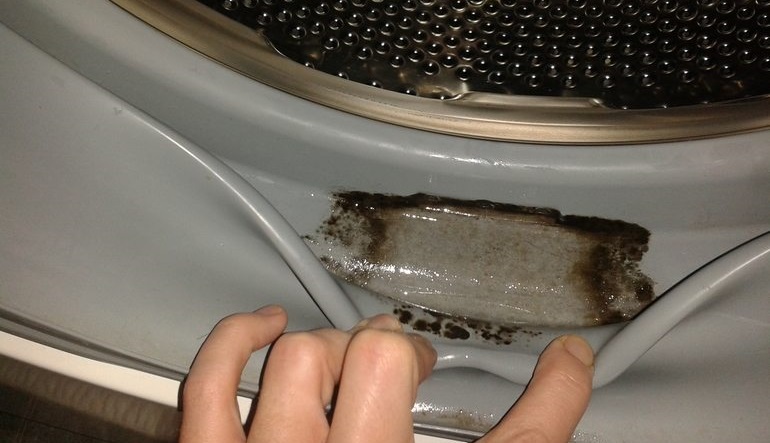
The purifier is also advantageous in its availability. Firstly, you can purchase it at any nearest store.Secondly, the cost of acid is an order of magnitude lower than that of professional cleaning products. Thirdly, most housewives have it in stock.
But vinegar also has several significant disadvantages:
- pungent odor (removed by additional rinsing and airing);
- aggressive effect on rubber and silicone components of the washing machine (the risk is minimal if you follow the dosage and do not use it frequently).
Vinegar is a proven and effective remedy that will help you clean the machine from fungus and plaque without extra effort and expense. The main thing is to carry out the procedure strictly according to the instructions and not to pour acid into the washing machine more than once every 3-6 months. The optimal frequency is twice a year.
Where does the stench and dirt come from?
If the washing machine constantly smells unpleasant, then cleaning alone will not solve the problem - you need to find the cause of the stench. As a rule, there will not be any particular difficulties with diagnosis: it is unlikely that there is forgotten rotten fish under the washing machine. No, the machine emits unpleasant odors from mold, garbage, scale, or all of them. This “wealth” arises due to the following factors: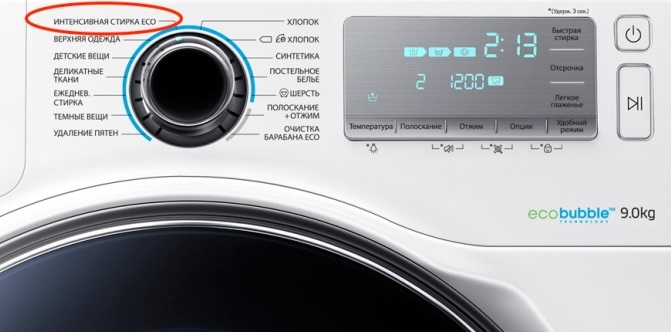
- poor tap water (often the water in the tap water is hard, contaminated and loaded with impurities);
- use of low-quality detergents (cheap powders do not dissolve well and settle inside the machine);
- frequent activation of the “Intensive Wash” program;
- Irregular cleaning of the washing machine (so much debris accumulates inside that the stench goes beyond the unit).
Scale is formed due to too hard water!
All this leads to the fact that the washing machine not only stinks, but also does not wash well, and fungus and mold emits fumes that are harmful to humans.There is a risk for the machine itself: a thick layer of scale provokes overheating of the heating element, which burns out and breaks. Rubber elements, cuffs, oil seals, and pipes that become damaged due to bacteria and plaque are also at risk.
Interesting:
1 reader comment

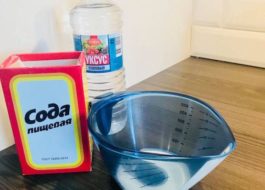

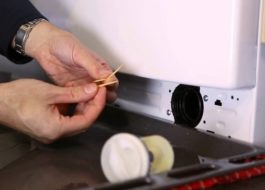
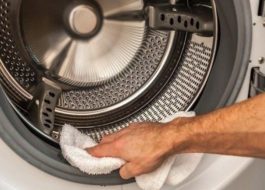
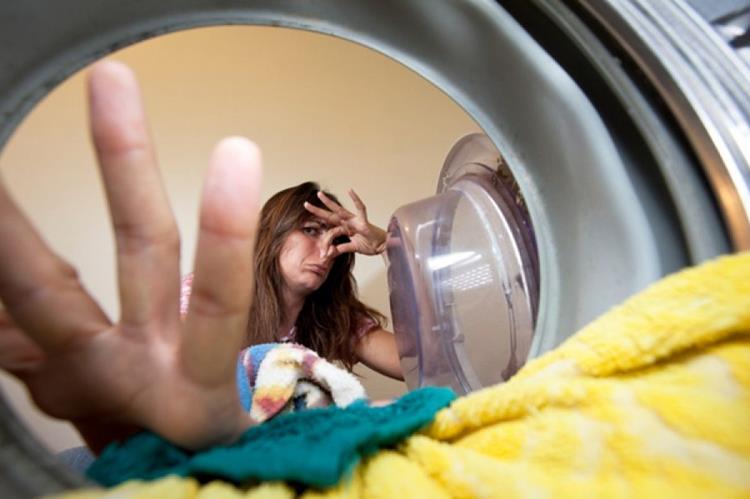
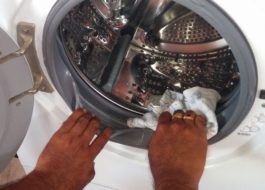


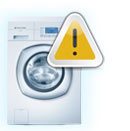
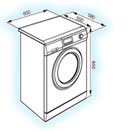


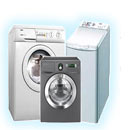
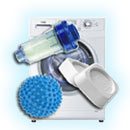


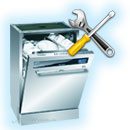
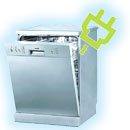


And if the pipe stinks and is not on sale, you can only order it to Moscow, but there is no time. Is it possible to clean the pipe, it is rubber and cannot be cleaned, what should I do?